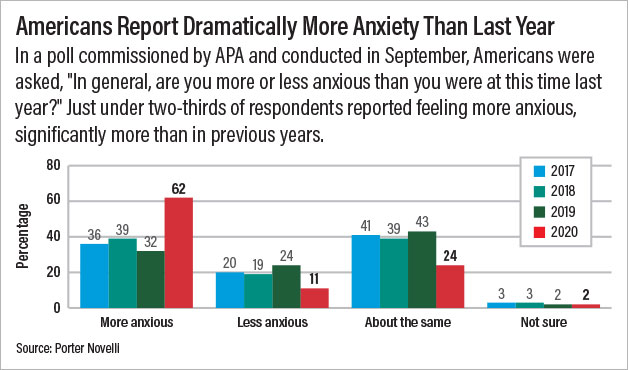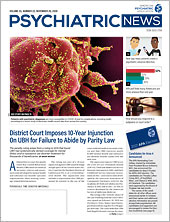Respondents to a poll commissioned by APA and released last month shows that they are significantly more anxious this year than in previous years.
Sixty-two percent of the respondents said that they felt more anxious this year than last year. That figure is nearly twice the percentage of respondents saying the same thing in 2019, 2018, and 2017. Moreover, a higher percentage reported feeling “extremely anxious” or “somewhat anxious” across a range of categories—personal health, family health, family safety—than in previous years.
Seventy-five percent of survey respondents said they were extremely or somewhat anxious about COVID-19, a unique event in 2020 that may be driving anxiety in other areas.
When asked what made them extremely or somewhat anxious, in addition to COVID-19, respondents said that the top issues were keeping themselves and their family safe (80%), their health (73%), and gun violence (73%). The survey also found that 72% of respondents said they were extremely or somewhat anxious about the November election.
The poll was conducted September 14 to 16 using a demographically representative sample of 1,004 adults 18 years or older by
ENGINE INSIGHTS. In addition to questions about anxiety, the survey included queries about systemic racism and mental health, climate change and mental health, stigma, mental health in the workplace, and telehealth.
“It’s not surprising that more Americans are anxious, given the circumstances we all find ourselves in this year,” said APA President Jeffrey Geller, M.D., M.P.H. “It’s normal to feel this way during times of stress, and a lot of people will likely weather this storm without serious mental health consequences. However, given the huge jump in anxiety, coupled with the impact the pandemic is having on those who were already living with mental illness or substance use disorders, the most important thing that we can do as a country is to invest in our mental health system.”
APA fielded a short poll on COVID-19’s mental health impacts in March and asked the same questions as part of this larger study. While the percentage of respondents indicating that COVID-19 has had a serious impact on their mental health stayed relatively flat (36% in March versus 37% in September), more said they had been fighting with loved ones (12% in March versus 17% in September) and consuming more substances or alcohol (8% in March versus 14% in September).
About half of those polled expressed some level of anxiety regarding the possibility of their loved ones contracting COVID-19, which was slightly lower than in March (56% in September versus 62% in March), while the level of anxiety regarding getting the virus themselves stayed flat (47% were anxious about the possibility in September versus 48% in March).
Racism Said to Affect Mental Health
Compounding the anxiety associated with COVID-19 has been the upwelling of social unrest following the killing of George Floyd in Minnesota. Seventy-six percent strongly or somewhat agreed that systemic racism impacts the mental health of Americans, especially people of color. Black Americans were more likely to strongly or somewhat agree with this statement (83%) than Latino or Hispanic Americans (78%), Asian Americans (77%), and White Americans (74%). Generational differences were less pronounced.
More than half (54%) of all respondents indicated that systemic racism strongly or somewhat impacts their own mental health. Black Americans were more likely to say so (68%) than Latino or Hispanic Americans (65%), Asian Americans (56%), and White Americans (51%).
“This poll underscores that as the Black community continues to suffer disproportionately from COVID-19, the added effects of ongoing racism and racial trauma are taking a significant toll on both mental and physical health,” Geller said. “The impact of structural inequities on the mental health of the Black community is far reaching, and each of us as psychiatrists has a vital role to play in tackling these issues. On a basic level, we must continue to strive to diversify the ranks of our profession and provide culturally responsive care to our patients.”
Finally, 2020 saw devastating fires throughout the Western United States as well as an intense tropical storm season impacting the U.S. East Coast and the Gulf Coast. The percentage of respondents who agreed that climate change is probably or definitely affecting mental health increased from 47% in 2019 to 68% in 2020, and the percentage saying it is affecting health increased from 65% in 2019 to 73% in 2020.
Younger adults are more likely to be concerned about the impact of climate change on mental health than older adults: 67% of Gen Zers (18 to 23 years) and 63% of millennials (24 to 39 years) are somewhat or very concerned about the impact of climate change on their mental health compared with 42% of baby boomers (56 to 74 years) and 58% of Gen Xers (40 to 55 years).
“The science on climate change is settled, and now the public, outside those who’ve been directly impacted, is beginning to understand the impact it has on overall health and mental health,” said APA CEO and Medical Director Saul Levin, M.D., M.P.A. “Policymakers need to take this into consideration as they consider steps to alleviate the ongoing crisis.” ■
More information on the poll is posted
here.

